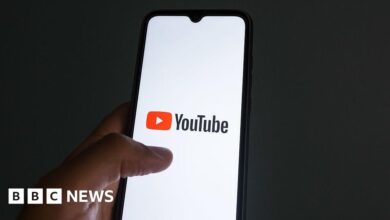How X users earn thousands from US election misinformation and AI images
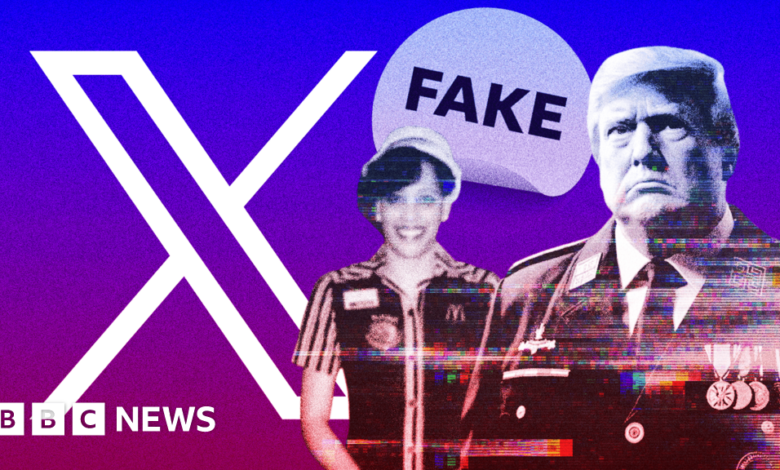
2024-10-30 02:42:50
 BBC
BBCSome users on X who spend their days sharing content that includes election misinformation, AI-generated images and unfounded conspiracy theories say they are being paid “thousands of dollars” by the social media site.
The BBC identified networks of dozens of accounts that re-share each other’s content multiple times a day – including a mix of true, unfounded, false and faked material – to boost their reach, and therefore, revenue on the site.
Several say earnings from their own and other accounts range from a couple of hundred to thousands of dollars.
They also say they coordinate sharing each other’s posts on forums and group chats. “It’s a way of trying to help each other out,” one user said.
Some of these networks support Donald Trump, others Kamala Harris, and some are independent. Several of these profiles – which say they are not connected to official campaigns – have been contacted by US politicians, including congressional candidates, looking for supportive posts.
On 9 October, X changed its rules so the payments made to eligible accounts with a significant reach are calculated according to the amount of engagement from premium users – likes, shares and comments – rather than the number of ads under their posts.
Many social media sites allow users to make money from their posts or to share sponsored content. But they often have rules which allow them to de-monetise or suspend profiles that post misinformation. X does not have guidelines on misinformation in the same way.
While X has a smaller user base than some sites, it has a significant impact on political discourse. It raises questions about whether X is incentivising users to post provocative claims, whether they’re true or not, at a highly sensitive moment for US politics.
The BBC compared the approximate earnings reported by some of these X users with the amount they would be expected to earn, based on their number of views, followers and interactions with other profiles, and found them to be credible.
Among the misleading posts shared by some of these networks of profiles were claims about election fraud which had been rebutted by authorities, and extreme, unfounded allegations of paedophilia and sexual abuse against the presidential and vice-presidential candidates.
Some misleading and false posts that originated on X have also spilled on to other social media sites with a bigger audience, such as Facebook and TikTok.
In one example, an X user with a small following says he created a doctored image purporting to show Kamala Harris working at McDonald’s as a young woman. Other users then pushed evidence-free claims that the Democratic Party was manipulating images of its candidate.
Unfounded conspiracy theories from X about the July assassination attempt on Donald Trump were also picked up on other social media sites.
X did not respond to questions about whether the site is incentivising users to post like this, nor to requests to interview owner Elon Musk.
‘It’s become a lot easier to make money’
Freedom Uncut’s content creation lair – where he streams and makes videos – is decorated with fairy lights in the shape of an American flag. He says he is an independent, but would rather Donald Trump becomes president than Kamala Harris.
Free – as his friends call him – says he can spend up to 16 hours a day in his lair posting on X, interacting with the network of dozens of content creators he’s a part of, and sharing AI-generated pictures. He does not share his full name or real identity because he says his family’s personal information has been exposed online, leading to threats.
He is by no means one of the most extreme posters, and has agreed to meet me and explain how these networks on X operate.
He says he has had 11 million views over the past few months since he began posting regularly about the US election. He brings several up on the screen as we chat at his home in Tampa, Florida.

Some are obviously satire – Donald Trump looking like a character in The Matrix as he brushes aside bullets, or President Joe Biden as a dictator. Other AI images are less fantastical – including an image of someone on the roof of their flooded home as fighter jets pass by, with the comment: “Remember that politicians don’t care about you on November 5th.”
The image echoes Mr Trump’s claim that there were “no helicopters, no rescue” for people in North Carolina following Hurricane Helene. The claim has been rebutted by the North Carolina National Guard, which says it rescued hundreds of people in 146 flight missions.
Freedom Uncut says he sees his images as “art” that sparks a conversation. He says he is “not trying to fool anybody” but that he can “do so much more by using AI”.
Since his profile was monetised, he says he can make in the “low thousands” monthly from X: “I think it’s become a lot easier for people to make money.”
He adds that some users he knows have been making more than five figures and claims he could corroborate this by seeing the reach of their posts: “It’s at that point it really does become a job.”
He says it is the “controversial” stuff that tends to get the most views – and compares this to “sensationalist” traditional media.
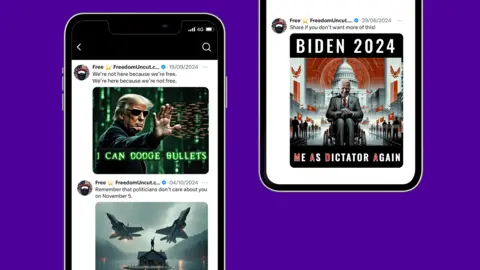
While he posts “provocative stuff”, he says it is “usually based in some version of reality”. But he suggests that other profiles he sees are happy to share posts they know not to be true. This, he says, is an easy “money-maker”.
Freedom Uncut dismisses concerns about false claims influencing the election, claiming the government “spreads more misinformation than the rest of the internet combined”.
He also says it is “very common” for local politicians to reach out to accounts like his on X for support. He says some of them have chatted to him about appearing on his live streams and spoken to him about creating and sharing memes, AI images and artwork for them.
Could any of these posts – misleading or not – have a tangible impact this election?
“I think that you’re seeing that currently. I think that a lot of the Trump support comes from that,” he says.
In Freedom Uncut’s view, there is “more trust in independent media” – including accounts sharing AI-generated images and misinformation – than in “some traditional media companies”.
‘No way to get to the truth’
Going head-to-head with the pro-Trump accounts Freedom Uncut describes are profiles such as Brown Eyed Susan, who has more than 200,000 followers on X.
She is part of a network of “die-hard” accounts posting content multiple times every hour in support of Democratic candidate Kamala Harris. While she uses her first name, she does not share her surname because of threats and abuse she has received online.
Speaking to me from Los Angeles, Susan says she never intended to start making money from her posts – or for her account’s reach to “explode”. Sometimes she posts and re-shares more than 100 messages a day – and her individual posts sometimes reach more than two million users each.
She says she only makes money from her posts because she was awarded a blue tick, which marks paid users on the site and some prominent accounts. “I didn’t ask for it. I can’t hide it, and I can’t return it. So I clicked on monetise,” she tells me, estimating she can make a couple of hundred dollars a month.
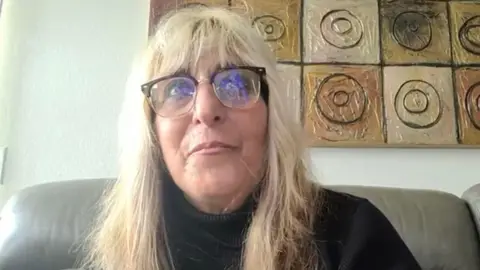
Aside from posting about policy, some of her most viral posts – racking up more than three million views – have promoted unfounded and false conspiracy theories suggesting the July assassination attempt was staged by Donald Trump.
She acknowledges that a member of the crowd and the shooter were killed, but says she has genuine questions about Donald Trump’s injury, the security failings, and whether the incident has been properly investigated.
“There’s no way to get to the truth in this. And if they want to call it conspiratorial, they can,” she says.
Susan also shares memes, some of which use AI, taking aim at the Republican contender. Several more convincing examples make him look older or unwell. She says these “illustrate his current condition”.
Others show him looking like a dictator. She maintains that all her images are “obvious” fakes.
Like Freedom Uncut, she says politicians, including congressional candidates, have contacted her for support, and she says she tries to “spread as much awareness” as she can for them.
‘They want it to be real’
Following a row over whether Kamala Harris once worked at McDonald’s, a doctored image of her in the fast food chain’s uniform was shared on Facebook by her supporters and went viral.
When some pro-Trump accounts realised it was an edited photo of a different woman in the uniform, it triggered unfounded accusations that the image came from the Democratic Party itself.
An account called “The Infinite Dude” on X appeared to be the first to share the image with the caption: “This is fake”. The person behind the image tells me his name is Blake and that he shared it as part of an experiment. His profile does not have nearly as many followers as the other accounts I have been talking to.
When I ask for evidence that he doctored the image, he told me he has “the original files and creation timestamps”, but he did not share those with me as he says proof does not really matter.
“People share content not because it’s real, but because they want it to be real. Both sides do it equally – they just choose different stories to believe,” he says.
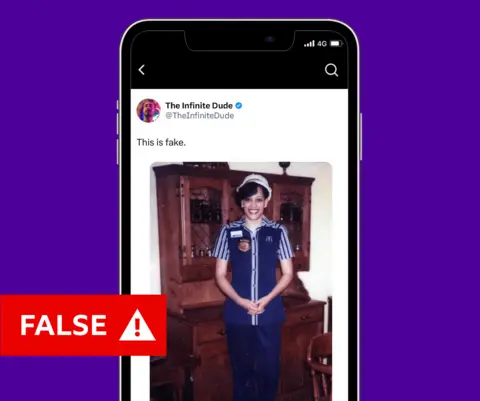
His political allegiance remains unclear and he says this “isn’t about politics”.
X says online that its priority is to protect and defend the user’s voice. The site adds manipulated media labels to some AI-generated and doctored video, audio and images. It also has a feature called Community Notes, which crowdsources fact-checking from users.
During the UK election, X did take action over a network of accounts sharing faked clips that I investigated. In the US election campaign, however, I have received no response to my questions or requests to interview Elon Musk.
That matters – because social media companies like his could affect what unfolds as voters head to the polls.
Marianna Spring investigated this story using her Undercover Voters – five fictional characters based on data from the Pew Research Centre – that allow her to interrogate what some different users are recommended on social media. Their social media accounts are private and do not message real people.
Find out more about them here – and on the BBC Americast podcast on BBC Sounds.



